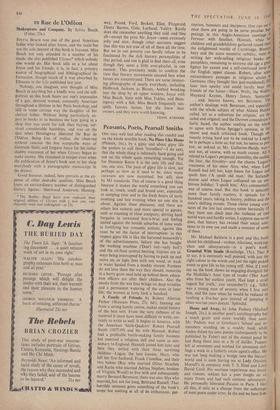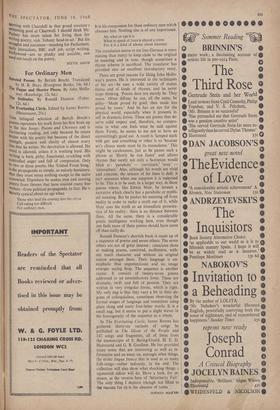Peasants, Poets, Pearsall Smiths
ONE may well feel after reading this candid and on the whole sensible book, No Place Like Home (Phoenix, 16s.), by a gipsy and about gipsy life (he prefers to call them `travellers'—1 do not), that the whole thing is infernally hard going and not on the whole quite rewarding enough. Yet for Dominic Reeve it is the only life and that, too, one sees. The pace of gipsy life is slow, not perhaps as slow as it used to be, since many caravans are now motorised, but still, slow by MI standards. This of course is a good thing because it makes the world something you can look at, touch, smell and brood over, especially at camping time and in the fresh hours of early morning and late evening when no one else is about. Against these pleasures, and there are others less esoteric and more special to gipsies, such as roaming in close company, driving hard bargains in unwanted bric-à-brac and feeling united against the hostile suburbia of tame souls (a fortifying but romantic notion), against this must be set the factor of interruption: in this respect gipsy life is like the harassed housewife's of the advertisements, before she has bought the washing machine (Don't toil—only boil') and the oil-fired central heating. Gipsies are al- ways being interrupted by having to pack up and move on, or light fires with wet wood, or wash in water hauled from a muddy stream. Farmers do not love them the way they should, motorists in a hurry grow mad held up behind them, educa- tion officers arc after their children. Also the smoke from the wet fires brings on deep wrinkles and a permanent watering of the eyes in later life; the women at forty look a hundred.
A Family of Friends, by Robert Allerton Parker (Museum Press, 27s. 6d.), fanning out from a strong family centre, makes social history of the best sort. From the very richness of its material it must have been difficult to write, cer- tainly to write so well. It begins in America, with the American 'birth-Quakers' Robert Pearsall Smith (1827-99) and his wife Hannah. Robert had a profitable bottle-making family business but received a religious c'all and came as mis- sionary to England. Hannah joined him later and here they settled with their three surviving children—Logan, the best known; Mary, who left her first husband, Frank Costelloe, and their two babies (Ray who married Oliver Strachey and Karin who married Adrian Stephen, brother of Virginia Woolf) to live with and subsequently marry Bernard Berenson; there was also Alys who married, but not for long, Bertrand Russell. That horrible sentence gives something of the book's scope but nothing at all of its enthusiasm, per- ception, humours and sharpness. One can see It once there are going to be some peculiar hal); penings in this Anglo-American marriage '' Fervour with Intellect. Hannah, while her children and grandchildren gathered round 001 the enlightened worlds of Cambridge, Blooms' bury and the more eccentric nobility, went °11, writing her wide-selling religious books and pamphlets, remaining to extreme old age a We'll fighter for causes and a self-confessed lover of the English upper classes. Robert, after some extraordinary passages in religious circles in Germany (they thought him god-maddened), fell later into apathy and could hardly bear the friends of the house—Shaw, Wells, the Webb'. Maynard Keynes, Henry James, Santayans . . . and, heaven knows, not Bercnson. The author's dealings with Berenson, and espeelallY with the whole subject of what Aldous Huxley called 'art as a substitute for religion,' are dc' tailed and original; and the Duveen conundrum is fairly faced, the author tending on the whole to agree with Sylvia Sprigge's opinion, in her recent and much criticised book. Though ob- viously trying hard not to be unkind to Logan' he is perhaps a little so; but not, he seems to PO' test, so unkind as Mr. Gathorne-Hardy was-- and not, of course, with so much reason. All is related to Logan's perpetual juvenility, the malice, the fear, the frivolity—and the charm. Logan's treatment of his sister Alys, who, when Lord Russell had left her, kept house for Logan and spoilt him CA spoilt old man,' the Icelandic doctor said when Logan collapsed on an am- bitious holiday; 'I spoilt him,' Alys commented). was of course mad. But this book is infinitely more than family matters, it spreads for a hundred years, taking in history, politics and the time's shifting moods. Those clever young crea• tures of the late last century totter heroically (if they have not died) into the violence of two world wars and hardly notice, I suppose one never does, that history has twisted their social solu- tions to its own use and made a monster of some of them.
Mr. Michael Baldwin is a poet and this book about his childhood—violent, hilarious, working- class and idiosyncratic—is a poet's book: Grandad With Snails (Routledge, 15s.). That is to say, it is extremely well pointed, with just the right colour in the words and just the right picked event to give life to his young self. Also, if I maY say so, the book shows an engaging disregard for the Mathilda's Aunt type of reader (`Her Aunt who from her earliest youth, Had kept a strict regard for truth,' you remember?): e.g., `Silky was a young man of seventy when I first met him, and the time when he would be reduced to vaulting a five-bar gate instead of jumping it clean was ten years distant.' Splendid.
Home and Away, by John Pudney (Michael Joseph, 21s.), is another poet's autobiography but a much gayer and more worldly than most. Mr. Pudney was at Gresham's School and re- members standing on a muddy bank while Auden fished his own poems (subsequently to be published by Faber) out of the dismal pond he had flung them into in a fit of dislike. Pudney left at seventeen and worked for seventeen shil- lings a week in a fatherly estate agent's office. He was not long making a bridge into the literary world and is soon having tea at Lady Ottoline Morrell's in company with T. S. Eliot and Lord David Cecil. His wartime experience was brave and riotous, seldom has a poet fought on so many fronts and had such eminent adventures. He personally liberated Picasso in Paris. I like all this, if only as a change from the sufferings of most poets under arms. In the end we have him sPorting with Churchill in that grand creature's swimming pool at Chartwell. I should think Mr. p udoeY has more talent for living than for writing poetry, vide 'Johnny head-in-air.' But his struggles and successes—standing for Parliament, uallY journalism, BBC staff job, script writing, Hollywood—are so plucky and amiable, one need not touch on the poetry.
STEVIE SMITH











































 Previous page
Previous page